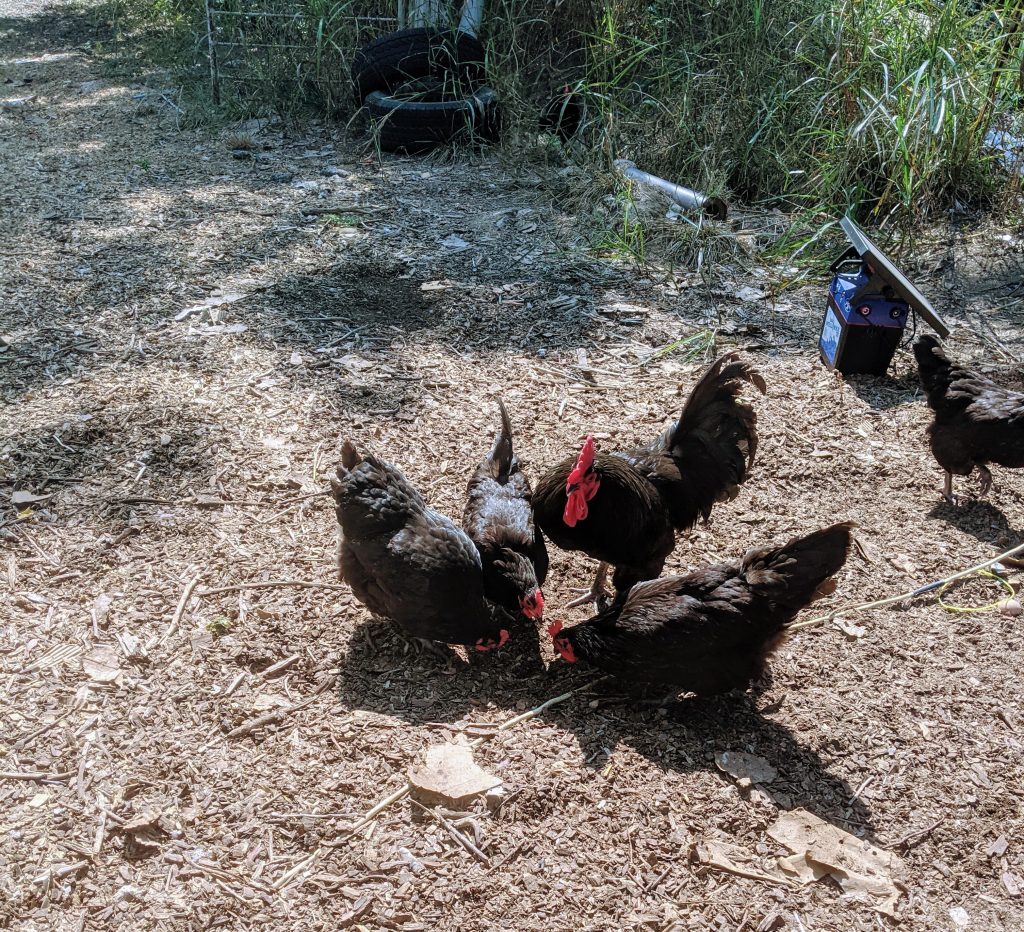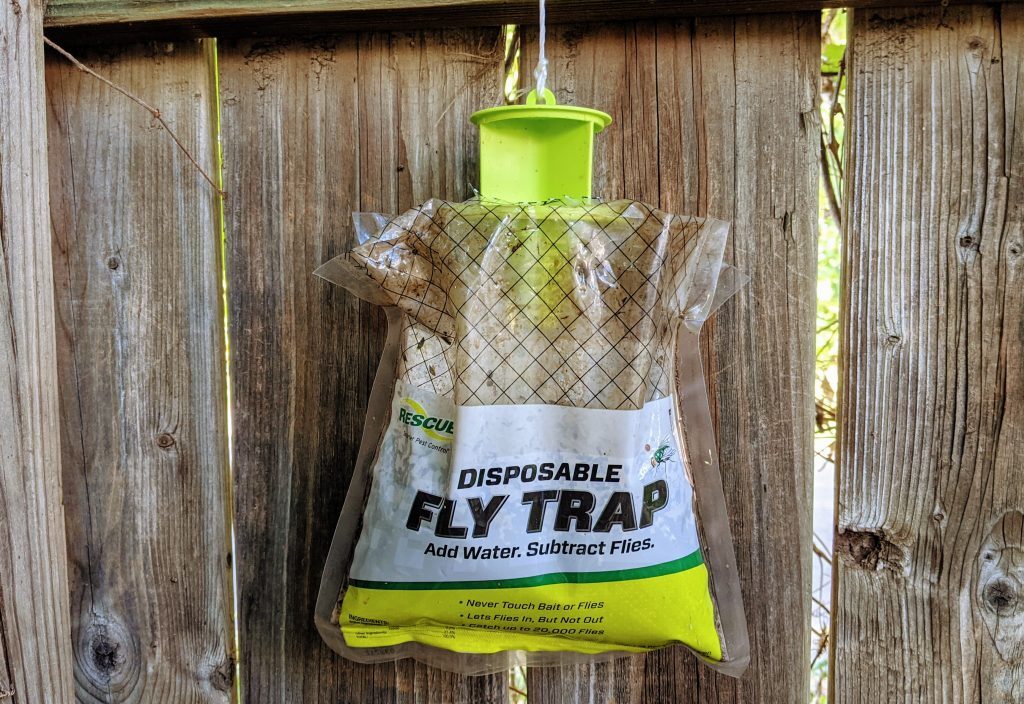Do Chickens Attract Unwanted Pests?
Chickens do a good job of keeping several pests at bay. However, if you’re considering raising chickens near your home, you might be concerned about what kind of animals and pests chickens may attract.
Chickens do attract several animals and pests. Flies, lice, mites, rodents, ants, and fleas are the most common pests. They also attract larger animals such as dogs, coyotes, foxes, raccoons, and aerial predators. All these predators whether big or small want to eat either your chicken or your chicken’s food. You can take preventative measures to prevent all of the pests chickens attract from becoming a problem. Sometimes these measures don’t work and you need to spend time and effort getting rid of them.
How Chickens Attract Pests
Larger predators are usually attracted to the chickens because they see chickens as food. Sometimes this is not the case. Dogs and raccoons specifically will hunt sometimes hunt for sport. When this happens, you will often find your deceased chicken(s) almost completely intact. For the most part though, larger animals hunt because they are hungry. Once they identify that your coop is protein heaven, they will continue to come back until they have consumed all of your chickens.
Chickens and chicken food will both attract different kinds of pests. Lice, mites, and fleas will come for the chicken. They will feed on them and cause health issues for your chickens. Rodents and ants will come for the food. Chickens won’t do much about rodents. Chickens will eat ants, but not enough to control an infestation. Flies will eat both the food and the chicken’s manure.

Larger Pest Prevention
Larger predators will not frequent your chicken coop if they know they cannot get in. A sturdy, secure chicken run will make it impossible for larger predators to get in. Once they realize this, they will leave you alone for the most part. They may come back on occasion to see if the situation has changed, but as long as you keep your chickens protected they will have no luck. My favorite product to use is the Premier 1 Electric Netting. Joel Salitin uses this fencing for his birds. It’s moveable and the electric aspect I have found truly deters any predators. I have not lost a single bird to predators while this fencing has been up and running. I use PoultryNet® Plus 12/42/3 (link to Premier1supplies .com).
Aerial predators require a roof over your chicken run. If you are using an electric fence (to prevent animals from climbing) you can use brightly colored string in a tight zigzag pattern across the top of the fence to keep aerial predators away.
Related Posts:
Owning Chickens: Are They Really Worth It?
How To Tell If You’re Raising Happy Chickens
Building A Chicken Run: The Best, Cheapest Way To Build
Smaller Pest Prevention
Your chickens will eat some smaller pests, but not near enough to keep up with an infestation. Some bugs and larvae are good and will help feed your chickens off the land. However, If you have a micro farm or you have chickens near your house, you will quickly find that you need to take action to keep your environment clean and livable.
Mites, Lice, And Fleas
The purpose of a dust bath is to prevent mites and lice. Mites and lice are tricky to deal with. There are several chemical and natural treatments, but a lot of the treatments require a cautious approach so you only harm the mites and not the birds. Some treatments are not safe to treat birds directly with. Any treatment you decide on should be double checked from multiple sources. I have not had a lice or mite infestation so I cannot speak to what works best. However, in my research for this post I found that there is some harmful information out there (please don’t use motor oil!).
The fact that we have never had mites or lice is a testament to the dust bath. Chickens naturally want to use a dust bath and will even make one if one is not provided. I have sprinkled a little diatomaceous earth (DE) into the dust bath for preventative care a couple times. People have differing opinions on DE. Some have had success treating mite infestations with DE alone and others say it can cause respiratory problems for your chickens. None of my chickens have ever suffered any respiratory issues, but I tend to err on the side of caution so I don’t do it much. Regardless of whether or not you use DE, dust baths are always a good idea.
Fleas are not prevented by the dust bath. However you can deter them by planting flea deterring plants (like mint) around your coop and adding garlic to their water. DE is also highly recommended as a flea infestation treatment.

Ants
The best way to prevent ants is to keep your chicken’s food in a sealed container. This will prevent the ants from finding the food. If you already have an ant problem, then you have found the right blogger. My family and I spent YEARS dealing with ants. We have tried countless natural and chemical remedies. By far the best solution we found is OptiGuard gel (link to Amazon). It’s designed as a bait for sugar/carbohydrate loving ants. It will lure the workers who take it back to their nest. All the ants feed on it and it kills the whole colony. This can be easily placed where your chickens cannot get to it. I love natural remedies, but none of them that we tried came close to fixing our ant problem. OptiGaurd knocked it out within a couple weeks.
We have had far less experience with protein loving ants, so I would recommend finding someone who does know more on that subject. This Ant Bait Choices article from Do-It-Yourself Pest Control is where I would start.
Rodents
Like ants, food is what attracts rodents. You need to store your food in sealed containers to keep rodents out of it. I have had rodent problems in the past. The best way that I’ve found to take care of them is to use sticky traps (link to Amazon). Whether we had a mice in the house or the garden, sticky traps have taken care of the them quickly and effectively.
The only downside that we have found with these is that they sometimes catch beneficial insects and reptiles. So, we only have them out when we know there’s a rodent we need to catch.
Flies
The only pest problem we’ve had that has rivaled the ants in severity was our fly problem. It only lasted a few months, but there were so many. There’s no way we could have dealt with them as long as we did the ants. While the ant situation was annoying and produced low grade anger, the flies had us looking for unconfessed sin in our lives. The combination of food scrap and chicken poop left in the chicken yard lured them. They were everywhere and they were fearless. Thankfully, we found the solution to this problem much faster than we did the ants.
We used a combination of two things. These disposable fly traps (link to Walmart) took care of a significant amount of flies, but by that time they had a very established home. There were fly larvae everywhere. The larvae would hatch and lay even more eggs before they found one of the traps. That’s when we brought in fly predators. Fly predators are muck smaller bugs that feed on the fly larvae. The fly predators themselves are safe for humans and animals, but deadly for flies. By killing the fly in it’s larval form before they can lay more eggs, you stop the cycle! After releasing a few bags of the fly predators, our fly problem was gone!
We now have normal amount of flies. Our situation has changed a bit since we started raising Black Solider flies. We can no longer introduce fly predators without risking their lives. Since the infestation has been brought under control and the chickens are mainly being fed off the land now, the chickens actually keep a lot of the flies at bay. If you are trying to prevent flies, you need to make sure your chicken yard and coop are as clean as possible. One of the added benefits to letting our chickens free range is that the chicken manure is no longer concentrated. This has led to a cleaner environment.

Summary
Chickens do attract unwanted pests. Raising chickens near your home will make this a much bigger concern. There are ways to prevent all pests some of which are highlighted in this post. Prevention is always the best way to go about peat control. Once a pest gets a foothold, it’s much harder to eradicate the pest than it is to prevent.
That being said, if you have chickens, chances are you will end up having some sort of pest problem. In addition to prevention practices you will likely have to implement some sort of eradication protocol. Persistence and research are key to getting rid of any infestation. No matter what you decide to treat with, make sure it’s safe for your chickens!
